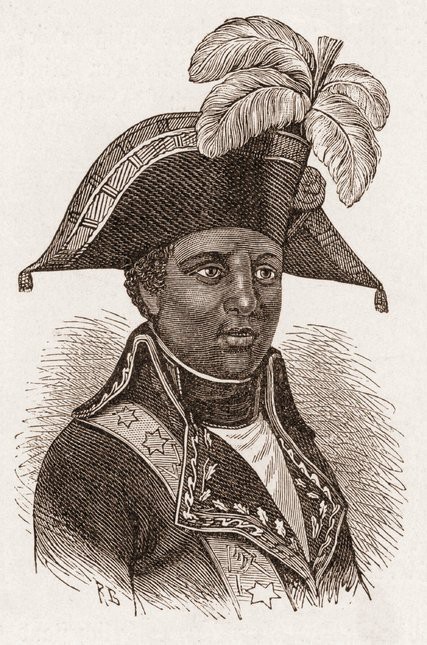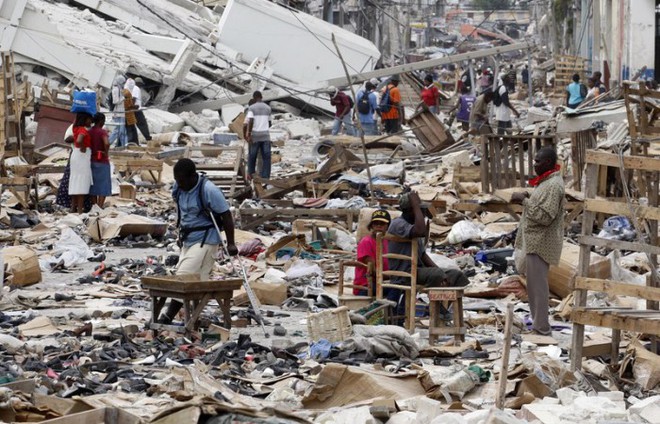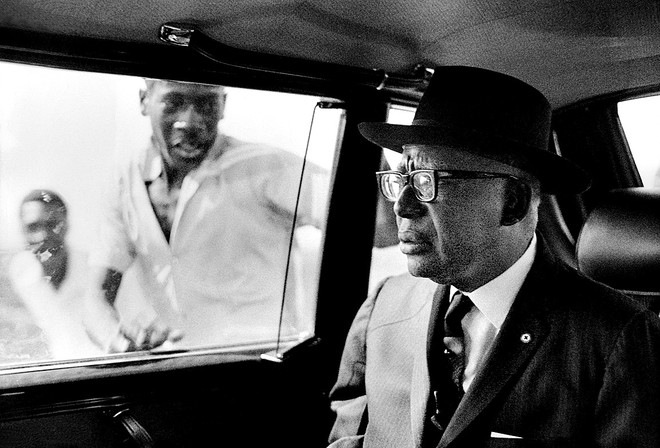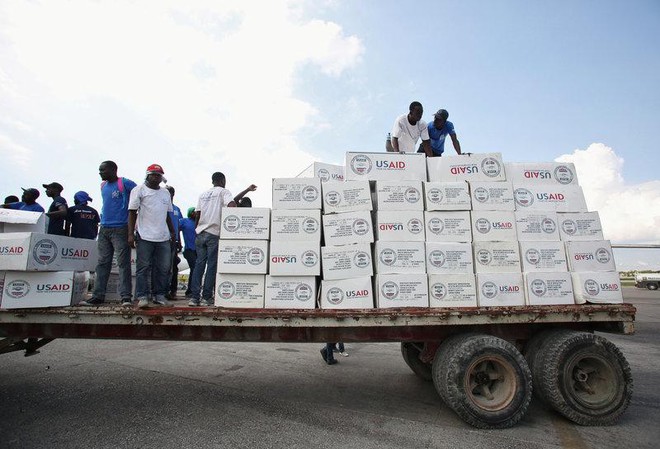Yesterday, my jaw nearly dropped to the floor when news broke that President Donald Trump called Haiti—a tiny island of 11 million people just 800 miles from Florida—a "s**thole" country whose people should not be allowed into the US. In Trump’s 2016 campaign for president, he opined that Haitians all had AIDs.
Trump is clueless about Haiti and its people, and its relationship to the US. His remarks cannot go unchallenged.
In an earlier life, I studied Haiti over several years, even wrote a book, "Haiti in the Balance," and published several studies on the country. I also taught Haitian students who had fled to Florida to escape the country’s various economic, political and natural disasters.
It is a fact that Haiti is the poorest country in the Western Hemisphere and among the top five poorest in the world, and has one of the worse governments anywhere. Some 80% live in poverty. One-half of Haitians live on less than US$1 per day. When I was there, it was common to see people selling one or two cigarettes on the street as their only source of income for the day.
The Haitian people are not a fault, but the country’s ruling elite, the US government, and international aid agencies are the culprits. Rather than blaming Haitians, we should ask why the world has made Haiti worse. Consider this: Haiti and the Dominican Republic share the same island. Haiti is poor, the DR is well off!


Haitian national hero Toussaint Louverture. Source: Getty
Haiti has been among the poorest countries throughout its history. It was a former colony of the French in the 1800s where African slaves and their descendants were exploited on cocoa, coffee and mango plantations. In 1804, slaves, led by national hero Toussaint Louverture, rebelled, overthrowing the French and creating the first free, Black republic. Things went seriously downhill from then on.
Out of the revolution, a new economic, governing class arose made up of mulattos—mixed race people of African and French descent.
Mulattos would come to dominate Haiti by consolidating economic and political power that they then exerted over the powerless, poor Black population. Even today, the mulatto ruling class constitutes only 1% of the population, but controls more than half of the economy and most of the government at least indirectly.
Haiti is rather a racist country. The poor Black population speaks Haitian-Creole, a language combining French and Haitian dialects, while the ruling class conducts business in French. The judicial system operates in French, but poor people don’t speak French, so they can be exploited.
Black leaders have arisen from time to time to seize control of the country. All eventually became (or tried to become) dictators and exploited the people who they often promised to represent. The second president of Haiti, Jean-Jacques Dessalines (1804-6), declared himself "emperor;" the third president, Henry Christophe (1806-11), declared himself "king." Several declared themselves "president for life."
Struggles to control Haiti and exploit it, have led to more than 200 years of instability and occasional civil war. From my research, "there have been 59 presidents of Haiti: 3 were assassinated or executed; 1 committed suicide; 6 died in office; 23 were overthrown in coups, 2 of them—one a military dictator and the other an excommunicated priest—twice. The US has compelled 5 to step down in the past 100 years. Only 10 completed a full term in office, and 31 served 2 years or less."Many of the presidents were drawn from the military or were beholden to it.
All of the international institutions like the UN, World Bank, and numerous aid agencies have observed that Haiti is perhaps among the worst governed countries, where the system is fraught with corruption, and the wealthy extract what little wealth there is to further their own interests. Haiti is a kleptocracy.


Houses destroyed by the earthquake in Haiti. Source: Reuters
If continuing political upheaval were not enough, Haiti is the most natural disaster prone country in the world. Just from 1993 to 2012, Haiti experienced one massive earthquake, two droughts, 31 floods, and 26 tropical storms or hurricanes. The problem with Haiti is that it is a land of steep hills. Over time, poor people, who have no access to electricity, cut down Haiti’s forests leaving the island barren. When the rains come, much of the population and their housing washes down the hills in massive mudslides, killing many people.
Haiti is probably most famous for the devastating earthquake in 2010 that destroyed the country, killing 230,000 people, and leaving millions homeless.
Even if Haiti was well governed and economically sound, it would still be highly dysfunctional. Natural disasters periodically erase much economic progress. In 2010, for example, not only did the earthquake destroy 100% of the economy, it also destroyed the government. Some 60% of the government buildings were destroyed, and 25% of the civil service died.

The US has played a role in exacerbating Haiti’s political problems. The US typically ignores Haiti unless the country leadership does something to antagonize US businesses on the island or threatens US regional security. Haiti has been a foreign policy "political football" for much of its history.
Before World War I, if memory serves, the US sent war ships to Haiti to intimidate its leadership on a dozen occasions. In 1915, the US actually invaded Haiti to protect American interests and occupied the country until 1934.

Haitian President "Papa Doc" Duvalier. Source: Historyanswers
Three recent presidents stand out as examples. "Papa Doc" Duvalier (1957-1971) and his son "Baby Doc" (1971-1986) became dictators of the country, using Germany’s Adolf Hitler as a model. The Duvaliersdisbanded much of the army, fearing a coup d’ tat. In its place they created their own private body guard, the TontonMacoute, a 10,000 person force of armed thugs who terrorized the people in a virtual police state, complete with spies, informants, and prisons. The US tolerated and even supported the Duvaliers because it thought Haiti would counterbalance Fidel Castro’s growing influence in the Caribbean. In the process, the Duvaliers stripped Haiti of most of its wealth.
Another standout was Jean-Bertrand Aristide, a defrocked priest who ran against a military dictatorship and won the presidency in 1991. He was then overthrown by the military and made to leave the country. He was forcibly returned to power in1994 by the US Marines under President Bill Clinton. Aristide, having learned from the Duvaliers, created his own private band of thugs, the Chimera, who terrorized his opposition. In2004, Aristide was overthrown in a coup and forced into exile to the Central African Republic. The US escorted him out of the country. Aristide was guilty of playing political factions against one another, accomplishing little, and presiding over massive corruption.
Since the 1950s, the US has interfered with Haitian elections, promoting candidates, influencing political parties, supporting some groups over others. The US was partly responsible for electing Papa Doc, then getting rid of Baby Doc, for example.
In 2010, the US tried to help Haiti respond to and recover from the earthquake. That hasn’t worked out well: poor governance could not deliver assistance to people in need, corruption syphoned off aid to the wealthy, and aid benefitted US donors not Haitians.

The international community, led by the US, has flooded Haiti with foreign aid at an estimated US$20 billion over six decades. Aid has gone to support food security, democratization, schools, economic development, and good governance. The amount spent on such a tiny country should have made a difference but it did not. In my view, it probably made things worse.

International assistance in Haiti. Source: Reuters
International assistance was unable to solve the real problem in Haiti: the entrenched elite that control the economic and political system for their own benefit. Elite control meant that the Haitian people were of little concern to those in power: they were only taken into consideration when their deprivation seemed to portend violence or uprising. "Elected" political leaders mirrored elite behavior: having been elected, they mostly reverted to exploiting the country as have elites, sometimes in partnership. Such a system can only breed corruption and incompetency.
So, much of the aid gets syphoned off into the wrong hands or is ineffectively managed so that it has little positive effect. Aid directed toward democratization causes further fragmentation. For example, aid was supposed to help form competitive political parties; what it did was create mass confusion by creating dozens of parties with small memberships who sought to influence elections. Food, health care, and school aid, placated the population, making them dependent on international organizations while their government was helpless to provide these basic services to the people.
Many news organizations have commented that international aid flowing to Haiti seems to be itself corrupted. Much of the aid money flows not to the Haitian government—which needs to develop a capacity to govern—but instead to outside organizations—NGOs for example—who may not be serving Haiti all that well. Some major books: Killing with Kindness: Haiti and International Aid; The Great Haiti Humanitarian Aid Swindle; How the World Came to Save Haiti and Left a Disaster Behind.

In November, the Trump administration announced that it was ending Temporary Protected Status (TPS) visa for some 60,000 Haitians displaced in the 2010 earthquake. They will have to return to Haiti in July 2019. Unfortunately, even after 8 years, returning to Haiti might be an undeserved punishment. Those returning will find just as much poverty as when they left, and will likely add to it. UN peace keepers in Haiti following the quake caused a major outbreak of cholera which has killed at least 5,000 and is still ravaging Haiti.
But US foreign policy made things bad for Haiti in the past. Under the Duvalieres in the 1970s and 80s, the dictators drove away teachers, physicians, entrepreneurs, and financiers, producing one of the largest "brain drains" in any country.In 1960, there were 5,000 Haitians in the US; by 1990, there were 225,000. President Bill Clinton turned away thousands of Haitian "boat people" fleeing economic and political crisis under Aristide in the 1990s.
At some point the US needs to rethink its policy toward Haiti. Once and for all! Fix Haiti so people will want to stay there.
Rather than throw them out, perhaps the US government should issue an apology for screwing up their country, and invest in them so they can return and help Haiti.
* For Vietnamese version, click here.
* Xem bản dịch bài viết bằng tiếng Việt tại đây.